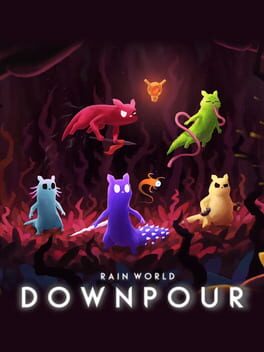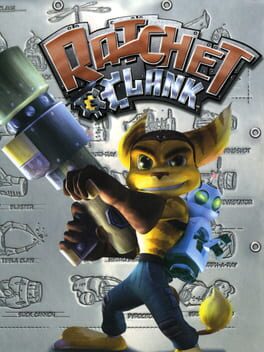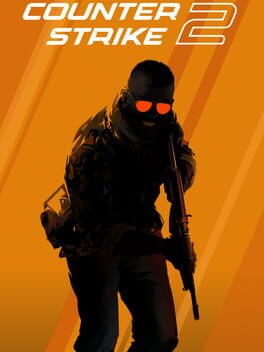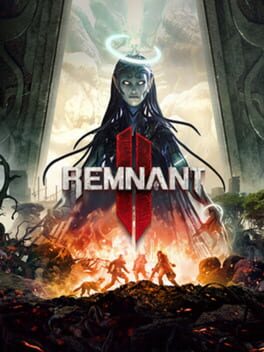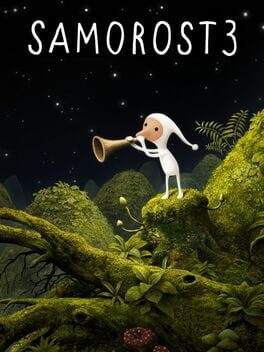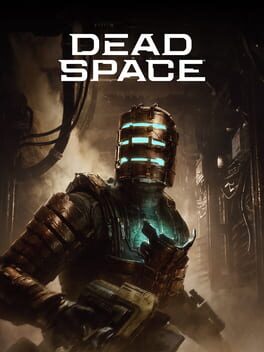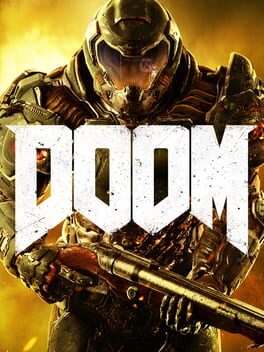rek
16 reviews liked by rek
Rain World: Downpour
2023
This review contains spoilers
Downpour is… difficult for me to make heads or tails of. At one end it’s an extremely expansive addition to Rain World’s universe in continuity, gameplay, causing the fandom to utterly erupt in size. In essence, Downpour IS Rain World now; a vast majority of fan content now revolves around the material it created, and by sheer volume it is far larger than its base components. Considering its origins as a fan mod, it’s extremely impressive how it garnered such acclaim and popularity, and I think the ambition to create something so transformative and wide in scope is to be lauded. Yet, I’m left with something that leaves me personally ambivalent. What is shown as a collection of 5 interwoven campaigns advertised as one cohesive story feels much more disjointed on a more thematic level, failing to match the base game’s marriage of gameplay design and story.
What I did love is how it improved my skills in this game, giving me far better appreciation for the skill ceiling, technical moves, and combat the game features. I do think the general emphasis on the DLC slugs’ combat abilities really helps. Each slugcat provides a unique gameplay twist, while also generally being at least somewhat justifiable in a way that I don’t think affects the game’s harsh atmosphere that much (except for Saint). I do think the highlights here in terms of additions are the new regions; they are exceptionally well done aesthetically and do fit in well, how they shift and deteriorate as time passes in the world per campaigns. Particular highlights include Outer Expanse, a beautiful region depicting the home of the slugcats seen in Survivor’s intro, Looks to the Moon in Spearmaster’s campaign, providing a glimpse of her facility, in full glory but on the precipice of collapse, and Silent Construct, an amalgamation of all of Five Pebbles’ can components after his sacrifice leaving a dead, metallic, cold superstructure.
I’m less keen on the new enemies; overall they’re generally underutilized or not very unique compared to the scugs. Those that are unique are rare, and the rest can essentially boil down to “what if we made a Red Lizard but slow, clumsy and caramel, or a Centipede that could swim in water”, or most egregiously, a Vulture with insta-kill beaks and lasers that feels way overtuned. Compared to the rest of the game’s mechanical additions it doesn’t really have as much care put into it, but even still then can provide unique spins in encounters, and Rain World’s gameplay loop is still as fresh as ever.
The campaigns themselves are… interesting. I think all of them are fun and bring something unique, but there’s always something major that impacts my enjoyment of them. Gourmand is probably the most untouched of the new campaigns, being very similar to Survivor’s except for a different final region and ending, with an emphasis on movement tricks, damage, and food. It’s not a very lore-intensive campaign which makes it more of a fun ride, though I’d argue the tonal shift of appreciating life feels a bit discordant with how the game plays and the base game’s theming in making the cycles painful directly through the punishing gameplay (and Gourmand’s spawns are harder than Survivor’s). I also don’t love the crafting system; some of the pairings are esoteric and others absurdly broken (ex. making explosive spears and what essentially amounts to black hole bombs). Overall, Gourmand was fun but not particularly deep or thought-provoking.
I think Artificer is overall the best campaign; a treatise on the consumption of revenge and how it can destroy you, and how even trying to fully resolve your trauma may not be possible. I think it also does the best of marrying motivations; Five Pebbles is annoyed of scavengers infesting his can, and they killed your slugpups. The fact deaths aren’t that punishing for the main route and that you’re always at negative reputation means combat with scavs can be fully indulged, which though at times is excessive is also very enjoyable. With your parry, stun and jump abilities, it’s Rain World combat at its most thrilling. I do wish grabbing scavenger bodies and using their karma to pass gates was more utilized, as the most-traveled route is almost always karma 1 doors. I think the worst thing about this campaign is that sometimes the scav kill squad spawns are absolutely absurd, as in “I can’t get to the next room because their corpses are stuffing the pipes” levels of bad. I’m also not in love with its last set piece, a combat gauntlet leading to a final boss. I really don’t think RW’s gameplay philosophy really works with boss fights, given you die in one hit while the boss must be hit several times, and the litany of spears. I had to cheese it to win. Still, I think this is the best part of the DLC overall, having better thematic resonance than the other DLC campaigns and the most unique spin on RW’s gameplay. Does it play like base RW? No, but it’s something unique, enjoyable and exemplifies one of the game’s oft-underrated traits.
Spearmaster’s campaign is probably the most frustrating; it’s the only one where the slugcat’s gimmicks are hampered halfway through (carrying a pearl that you can’t store as you don’t have a mouth, meaning you lose dual spears). I had passages that allowed me to skip the backtracking, but if you don’t, I’d imagine that traversing with said pearl is an utter slog given if you lose it, you have to redo the cycle again. It’s a shame too, considering that it is by far the most expansive from a world-building perspective, as you’re sent by 2 iterators as a last-ditch effort to prevent FP from collapsing Moon’s can via water consumption. I like the idea behind expanding the iterators here and it generally works, but their tone feels distinctly emotional as opposed to their detachment in the base game (even in logs discussing the same events). Something about the way they’re written here just doesn’t feel right to me, I don’t know, but I’m not the only one who’s noticed judging by other reviews. However, exploring Looks to the Moon was wonderful; it’s aesthetically gorgeous, the music is incredible, and her final farewell in the wake of your failure to stop FP was my favorite bit of writing from the DLC and a nice end point for the prequel campaigns.
Rivulet is solid, but its short length gives it very little impact. I think they’re fun to play overall due to their extreme movement, much like Artificer is best at exemplifying the game’s combat. Though it’s not perfect, I do like what’s done here narratively, as Five Pebbles tries his best to make up for what he did to Moon by entrusting you with delivering his last power source to her, as the Rot has fully consumed him. I kind of just wish there was more to it, the gimmicks make the campaign way easier in the second half and it sort of just speeds by. I also do find Riv probably the least detached in terms of their goal, here it kind of just feels like Rivulet is helping make amends between FP and LTTM for the sake of an adventure, to the point Moon questions why you even helped her if you return to a completed save file.
Saint is ultimately my least favorite campaign, and it’s unfortunate, because it’s the most interesting of the bunch, providing an coda to the game’s world and characters. Taking place far in the future, I do love how transformative it is. Seeing the world suffer from an entropic cold that slowly saps Saint’s energy and makes the campaign more visually hostile is novel, as almost everything is frozen over. Five Pebbles is now in ruin, the rot and lack of power leading to his collapse. That all too familiar pathway from Chimney Canopy to the Wall being just gone made it really set in for me. I wish I could heap praise onto it; I saw many people hype up the campaign as the best part of the DLC, but Saint is where DP’s cracks really show.
To start with, Saint’s gameplay never really becomes enjoyable to me. The tougher spawns make the first half of the campaign tedious, where you have practically no self-defense. You’d think the ice age would lead to a more quiet, solemn campaign as the fauna struggle to adapt, but I digress. The tongue is a nice ability that opens up traversal, but compared to other scugs’ movement options, it just feels like a slightly altered version of grappling worms. Once reaching all the echoes, you’re given the ability to ascend enemies and fly on a shared recharge. Even disregarding how this trivializes every enemy in the overworld due to it being an instant kill, it’s finicky to control and makes the tongue kind of moot. While many of Downpour’s scugs have abilities that may not necessarily jive well with the game’s built-in difficulty and themes, they felt like a somewhat reasonable adaptation. Having ascension powers felt like a huge thematic deviation gameplay-wise from the base game given your decentering in the narrative and environment, and a deviation thematically from the DLC which is generally far more pessimistic with regards to ascension.
I’m also not sure about the echo dialogue changes and the anthropomorphizing of the Void Sea; it seems to have physically expanded upward with malicious intent, but on the other hand you’re ascending animals left and right using knowledge from Echoes that have turned on the belief system that got them there. It just feels very dissonant with both the base game’s ideas of escaping the cycles within a world you fundamentally can’t change, that is as it is, and DP’s favoring of life’s value even amidst its cyclical nature. I think it would’ve been fine if the game was being more explicit regarding ascension and enacting that onto others, or adding ambiguity if it was at least willing to engage the topic and its morality. Here you have a perfect chance with Five Pebbles and Looks to the Moon, both run down due to their circumstances and mistakes, but perhaps learning the value of life after going through much hardship, as DP seems to lean. Unfortunately, I feel the DLC doesn’t take this opportunity; they remain noncognizant of your ascension abilities, dying in silence. I understand FP’s reactions given his state, but even LTTM’s overseers nor her facility even acknowledge her passing, a disappointing deviation from their reactivity in the base game. As such the actual process of ascending them personally just felt hollow.
Something I noticed in general is that despite Downpour’s general turn in direction to making the slugcats extremely important to the narrative and our view of the world, I feel it’s still missing some of the reactivity of the original. There’s alternate endings, but their execution is lacking, most notably with the Outer Expanse endings available for Monk and Survivor. Instead of ascending, they find their home, the former reuniting with the latter when going to OE. Now, though I’m indecisive on these endings (the dream sequences imply they’ve given up seeing their family, but at the same time they also did assume that they had ascended), my biggest gripe is that Monk’s version always leads to them meeting up with their sibling, even if you ascended Survivor. I’m not sure why this permutation wasn’t considered, it feels incredibly jarring and could’ve led to something really emotional. Similarly, Moon’s overseers don’t really give a shit if you ascend her as Saint.
Unfortunately, the final region Rubicon just sucks. I like the concept of it being oddly interpolated existing regions, but it’s essentially a giant, linear combat gauntlet with the hardest enemies in the game, and I had horrendous framerate drops with Miros Vultures and Guardians on the same screen (which considering the preciseness required to aim Saint’s relatively small ascension beam is frustrating). It’s arguably the worst combat segment in the game. The ending similarly leaves me disenchanted. FP and LTTM’s dialogue at the end of Rubicon leaves it very ambiguous whether ascending them even did anything, questioning if they truly escaped, or if they are just in a dream. It ends with Saint attempting to ascend a Void Worm, which results in them being completely drained of karma, seemingly becoming an echo as a result, and being sent back to the beginning of their campaign to relive their memories over again (though the fact you can transfer items between playthroughs via your stomach muddies it even more).
I’m not opposed to interpretative story elements; the base game does it all the time, and there are other games I enjoy with obscure interpretations/lore. However, Saint’s campaign to me oversteps the line because I don’t think any interpretation makes sense on its own merit. If Saint is a bodhisattva-esque figure who tries to help ascend all other beings before themselves, much like the Triple Affirmative was desired to be, what was the purpose of even going to Rubicon, which seems to end their mission early? If they’re anti-ascension, why do they impose it on other species, and why even go to Rubicon to get themselves stuck in echo hell? If this is Saint’s character arc, I don’t think DP communicates it very well either. Dev statements made after release if anything narrows potential theories even more (as they explicitly deconfirmed Saint’s origin as a triple affirmative and how Sliver of Straw potentially ascended, despite it being the subject of Challenge 70). Unfortunately, it feels like DP collapses at its finish line; like Saint themselves, I’m stuck cyclically trying to decipher what was even going on here.
It’s still a fun and brutal romp through the ever-shifting climate of Rain World, as always. Unfortunately, for a DLC whose aim was to expand and provide a full view of the Rain World timeline, it falters and kind of drags the whole thing down. Every campaign had something that bothered me. Either the campaign’s structure itself didn’t feel finely tuned by virtue of mid-campaign twists, weird balancing, or short length, or it felt thematically jarring either with the base game or itself. To speak nothing of the numerous technical issues with level geometry, performance, crashing, etc. that I had to deal with that wasn’t present in the base game. Most of all though, I can’t really make sense of what the DLC is generally trying to say. On the one hand, Rivulet, Gourmand, and Spearmaster give a sense that life is still precious in Rain World, it’s sacred, it’s worth protecting, despite the hostility, the rains, the infinitely repeating cycles. At the same time, Artificer warns against falling to life’s vices to the point it destroys you without any sort of enlightenment being possible, and Saint’s campaign makes the DLC’s anti-ascension slant way more tangled up.
Rain World very much is a game that reciprocates what you put into it, and I never could open myself up to DP; I guess I could chalk that up to just not being the experience the original was for me. Regardless, I think experimentation is better than rote repetition. The MSC team took a lot of commendable risks from a story and gameplay perspective releasing this, and there was a ton of content I didn’t get to experience myself (ex. expeditions, challenges, etc.). While Downpour swings for the fences, and misses frequently, I’m glad it exists, at the very least to give Rain World the flowers it deserves. Despite my numerous issues with Downpour, it feels bittersweet to finally close my chapter on one of the most unique worlds and games in the medium.
What I did love is how it improved my skills in this game, giving me far better appreciation for the skill ceiling, technical moves, and combat the game features. I do think the general emphasis on the DLC slugs’ combat abilities really helps. Each slugcat provides a unique gameplay twist, while also generally being at least somewhat justifiable in a way that I don’t think affects the game’s harsh atmosphere that much (except for Saint). I do think the highlights here in terms of additions are the new regions; they are exceptionally well done aesthetically and do fit in well, how they shift and deteriorate as time passes in the world per campaigns. Particular highlights include Outer Expanse, a beautiful region depicting the home of the slugcats seen in Survivor’s intro, Looks to the Moon in Spearmaster’s campaign, providing a glimpse of her facility, in full glory but on the precipice of collapse, and Silent Construct, an amalgamation of all of Five Pebbles’ can components after his sacrifice leaving a dead, metallic, cold superstructure.
I’m less keen on the new enemies; overall they’re generally underutilized or not very unique compared to the scugs. Those that are unique are rare, and the rest can essentially boil down to “what if we made a Red Lizard but slow, clumsy and caramel, or a Centipede that could swim in water”, or most egregiously, a Vulture with insta-kill beaks and lasers that feels way overtuned. Compared to the rest of the game’s mechanical additions it doesn’t really have as much care put into it, but even still then can provide unique spins in encounters, and Rain World’s gameplay loop is still as fresh as ever.
The campaigns themselves are… interesting. I think all of them are fun and bring something unique, but there’s always something major that impacts my enjoyment of them. Gourmand is probably the most untouched of the new campaigns, being very similar to Survivor’s except for a different final region and ending, with an emphasis on movement tricks, damage, and food. It’s not a very lore-intensive campaign which makes it more of a fun ride, though I’d argue the tonal shift of appreciating life feels a bit discordant with how the game plays and the base game’s theming in making the cycles painful directly through the punishing gameplay (and Gourmand’s spawns are harder than Survivor’s). I also don’t love the crafting system; some of the pairings are esoteric and others absurdly broken (ex. making explosive spears and what essentially amounts to black hole bombs). Overall, Gourmand was fun but not particularly deep or thought-provoking.
I think Artificer is overall the best campaign; a treatise on the consumption of revenge and how it can destroy you, and how even trying to fully resolve your trauma may not be possible. I think it also does the best of marrying motivations; Five Pebbles is annoyed of scavengers infesting his can, and they killed your slugpups. The fact deaths aren’t that punishing for the main route and that you’re always at negative reputation means combat with scavs can be fully indulged, which though at times is excessive is also very enjoyable. With your parry, stun and jump abilities, it’s Rain World combat at its most thrilling. I do wish grabbing scavenger bodies and using their karma to pass gates was more utilized, as the most-traveled route is almost always karma 1 doors. I think the worst thing about this campaign is that sometimes the scav kill squad spawns are absolutely absurd, as in “I can’t get to the next room because their corpses are stuffing the pipes” levels of bad. I’m also not in love with its last set piece, a combat gauntlet leading to a final boss. I really don’t think RW’s gameplay philosophy really works with boss fights, given you die in one hit while the boss must be hit several times, and the litany of spears. I had to cheese it to win. Still, I think this is the best part of the DLC overall, having better thematic resonance than the other DLC campaigns and the most unique spin on RW’s gameplay. Does it play like base RW? No, but it’s something unique, enjoyable and exemplifies one of the game’s oft-underrated traits.
Spearmaster’s campaign is probably the most frustrating; it’s the only one where the slugcat’s gimmicks are hampered halfway through (carrying a pearl that you can’t store as you don’t have a mouth, meaning you lose dual spears). I had passages that allowed me to skip the backtracking, but if you don’t, I’d imagine that traversing with said pearl is an utter slog given if you lose it, you have to redo the cycle again. It’s a shame too, considering that it is by far the most expansive from a world-building perspective, as you’re sent by 2 iterators as a last-ditch effort to prevent FP from collapsing Moon’s can via water consumption. I like the idea behind expanding the iterators here and it generally works, but their tone feels distinctly emotional as opposed to their detachment in the base game (even in logs discussing the same events). Something about the way they’re written here just doesn’t feel right to me, I don’t know, but I’m not the only one who’s noticed judging by other reviews. However, exploring Looks to the Moon was wonderful; it’s aesthetically gorgeous, the music is incredible, and her final farewell in the wake of your failure to stop FP was my favorite bit of writing from the DLC and a nice end point for the prequel campaigns.
Rivulet is solid, but its short length gives it very little impact. I think they’re fun to play overall due to their extreme movement, much like Artificer is best at exemplifying the game’s combat. Though it’s not perfect, I do like what’s done here narratively, as Five Pebbles tries his best to make up for what he did to Moon by entrusting you with delivering his last power source to her, as the Rot has fully consumed him. I kind of just wish there was more to it, the gimmicks make the campaign way easier in the second half and it sort of just speeds by. I also do find Riv probably the least detached in terms of their goal, here it kind of just feels like Rivulet is helping make amends between FP and LTTM for the sake of an adventure, to the point Moon questions why you even helped her if you return to a completed save file.
Saint is ultimately my least favorite campaign, and it’s unfortunate, because it’s the most interesting of the bunch, providing an coda to the game’s world and characters. Taking place far in the future, I do love how transformative it is. Seeing the world suffer from an entropic cold that slowly saps Saint’s energy and makes the campaign more visually hostile is novel, as almost everything is frozen over. Five Pebbles is now in ruin, the rot and lack of power leading to his collapse. That all too familiar pathway from Chimney Canopy to the Wall being just gone made it really set in for me. I wish I could heap praise onto it; I saw many people hype up the campaign as the best part of the DLC, but Saint is where DP’s cracks really show.
To start with, Saint’s gameplay never really becomes enjoyable to me. The tougher spawns make the first half of the campaign tedious, where you have practically no self-defense. You’d think the ice age would lead to a more quiet, solemn campaign as the fauna struggle to adapt, but I digress. The tongue is a nice ability that opens up traversal, but compared to other scugs’ movement options, it just feels like a slightly altered version of grappling worms. Once reaching all the echoes, you’re given the ability to ascend enemies and fly on a shared recharge. Even disregarding how this trivializes every enemy in the overworld due to it being an instant kill, it’s finicky to control and makes the tongue kind of moot. While many of Downpour’s scugs have abilities that may not necessarily jive well with the game’s built-in difficulty and themes, they felt like a somewhat reasonable adaptation. Having ascension powers felt like a huge thematic deviation gameplay-wise from the base game given your decentering in the narrative and environment, and a deviation thematically from the DLC which is generally far more pessimistic with regards to ascension.
I’m also not sure about the echo dialogue changes and the anthropomorphizing of the Void Sea; it seems to have physically expanded upward with malicious intent, but on the other hand you’re ascending animals left and right using knowledge from Echoes that have turned on the belief system that got them there. It just feels very dissonant with both the base game’s ideas of escaping the cycles within a world you fundamentally can’t change, that is as it is, and DP’s favoring of life’s value even amidst its cyclical nature. I think it would’ve been fine if the game was being more explicit regarding ascension and enacting that onto others, or adding ambiguity if it was at least willing to engage the topic and its morality. Here you have a perfect chance with Five Pebbles and Looks to the Moon, both run down due to their circumstances and mistakes, but perhaps learning the value of life after going through much hardship, as DP seems to lean. Unfortunately, I feel the DLC doesn’t take this opportunity; they remain noncognizant of your ascension abilities, dying in silence. I understand FP’s reactions given his state, but even LTTM’s overseers nor her facility even acknowledge her passing, a disappointing deviation from their reactivity in the base game. As such the actual process of ascending them personally just felt hollow.
Something I noticed in general is that despite Downpour’s general turn in direction to making the slugcats extremely important to the narrative and our view of the world, I feel it’s still missing some of the reactivity of the original. There’s alternate endings, but their execution is lacking, most notably with the Outer Expanse endings available for Monk and Survivor. Instead of ascending, they find their home, the former reuniting with the latter when going to OE. Now, though I’m indecisive on these endings (the dream sequences imply they’ve given up seeing their family, but at the same time they also did assume that they had ascended), my biggest gripe is that Monk’s version always leads to them meeting up with their sibling, even if you ascended Survivor. I’m not sure why this permutation wasn’t considered, it feels incredibly jarring and could’ve led to something really emotional. Similarly, Moon’s overseers don’t really give a shit if you ascend her as Saint.
Unfortunately, the final region Rubicon just sucks. I like the concept of it being oddly interpolated existing regions, but it’s essentially a giant, linear combat gauntlet with the hardest enemies in the game, and I had horrendous framerate drops with Miros Vultures and Guardians on the same screen (which considering the preciseness required to aim Saint’s relatively small ascension beam is frustrating). It’s arguably the worst combat segment in the game. The ending similarly leaves me disenchanted. FP and LTTM’s dialogue at the end of Rubicon leaves it very ambiguous whether ascending them even did anything, questioning if they truly escaped, or if they are just in a dream. It ends with Saint attempting to ascend a Void Worm, which results in them being completely drained of karma, seemingly becoming an echo as a result, and being sent back to the beginning of their campaign to relive their memories over again (though the fact you can transfer items between playthroughs via your stomach muddies it even more).
I’m not opposed to interpretative story elements; the base game does it all the time, and there are other games I enjoy with obscure interpretations/lore. However, Saint’s campaign to me oversteps the line because I don’t think any interpretation makes sense on its own merit. If Saint is a bodhisattva-esque figure who tries to help ascend all other beings before themselves, much like the Triple Affirmative was desired to be, what was the purpose of even going to Rubicon, which seems to end their mission early? If they’re anti-ascension, why do they impose it on other species, and why even go to Rubicon to get themselves stuck in echo hell? If this is Saint’s character arc, I don’t think DP communicates it very well either. Dev statements made after release if anything narrows potential theories even more (as they explicitly deconfirmed Saint’s origin as a triple affirmative and how Sliver of Straw potentially ascended, despite it being the subject of Challenge 70). Unfortunately, it feels like DP collapses at its finish line; like Saint themselves, I’m stuck cyclically trying to decipher what was even going on here.
It’s still a fun and brutal romp through the ever-shifting climate of Rain World, as always. Unfortunately, for a DLC whose aim was to expand and provide a full view of the Rain World timeline, it falters and kind of drags the whole thing down. Every campaign had something that bothered me. Either the campaign’s structure itself didn’t feel finely tuned by virtue of mid-campaign twists, weird balancing, or short length, or it felt thematically jarring either with the base game or itself. To speak nothing of the numerous technical issues with level geometry, performance, crashing, etc. that I had to deal with that wasn’t present in the base game. Most of all though, I can’t really make sense of what the DLC is generally trying to say. On the one hand, Rivulet, Gourmand, and Spearmaster give a sense that life is still precious in Rain World, it’s sacred, it’s worth protecting, despite the hostility, the rains, the infinitely repeating cycles. At the same time, Artificer warns against falling to life’s vices to the point it destroys you without any sort of enlightenment being possible, and Saint’s campaign makes the DLC’s anti-ascension slant way more tangled up.
Rain World very much is a game that reciprocates what you put into it, and I never could open myself up to DP; I guess I could chalk that up to just not being the experience the original was for me. Regardless, I think experimentation is better than rote repetition. The MSC team took a lot of commendable risks from a story and gameplay perspective releasing this, and there was a ton of content I didn’t get to experience myself (ex. expeditions, challenges, etc.). While Downpour swings for the fences, and misses frequently, I’m glad it exists, at the very least to give Rain World the flowers it deserves. Despite my numerous issues with Downpour, it feels bittersweet to finally close my chapter on one of the most unique worlds and games in the medium.
Rain World: Downpour
2023
I kept trying to add this to the appropriate wikipedia article but they blockd me from editing it for some reason.....
Ratchet & Clank
2002
One of those games that encapsulates the creative, fun-loving spirit of the PS2 era for me. It’s full of little touches that give it so much personality and character, the title screen with the quiet ambience of Ratchet working away in his garage, the CRT filtered menus, the expressive animations, even subtle ones that most wouldn’t catch, and that excellent score which always sets the right mood, but also knows when to back off and let things on screen play out. Every creative decision in this game feeds into the next, it has some of the best theming of any game with everything tying in one way or another into the satire of consumerism and artificial pop culture, almost like a PG Robocop. The gameplay creates this unique blend of shooting and playforming. Despite the aiming being kind of awkward, I actually like the lack of a strafe run in this one because it forces you to think a bit more carefully on what weapon to use in each circumstance, and the weapons are very creative and diverse with each fitting a certain situation. It definitely has it’s moments of datedness and jank (as in most of the minigames) but I think most of what’s here still holds up pretty well.
Ratchet & Clank
2002
Finished replaying the first Ratchet and Clank game that was released in 2002 and I'm honestly impressed for it being the first game in the entire series. The gun play is very fun. The guns are very useful and fun. Humor is great. Story is simple, but enjoyable and good. Voice acting, though not the best, still good after all this time. The way that these levels are designed is filled with creativity and shows they really have fun while developing this game. The soundtrack is definitely giving off that galactic space vibe, which definitely fits.
For the flaws, some stuff hasn't aged well enough. For example, the way aiming works. I honestly wish strafing was added to the PS3 collection because man is it a pain to aim sometimes. Even sometimes when doing it in first person. Ratchet is honestly, a dick. I get that it is the point since he developed to stop being like this overtime, but man does it get overboard at times. The checkpoints can be so annoying at times when you die. Especially when you are very close to the end of one section and you get unlucky so that you have to redo that entire section again.
Overall, a fun classic on the playstation that you'll have fun despite it showing it's age and that it can be dated. You won't be bored and you'll have a good time.
For the flaws, some stuff hasn't aged well enough. For example, the way aiming works. I honestly wish strafing was added to the PS3 collection because man is it a pain to aim sometimes. Even sometimes when doing it in first person. Ratchet is honestly, a dick. I get that it is the point since he developed to stop being like this overtime, but man does it get overboard at times. The checkpoints can be so annoying at times when you die. Especially when you are very close to the end of one section and you get unlucky so that you have to redo that entire section again.
Overall, a fun classic on the playstation that you'll have fun despite it showing it's age and that it can be dated. You won't be bored and you'll have a good time.
Counter-Strike 2
2023
Remnant II
2023
There was a couple weeks there where I was playing this pretty compulsively. The moment to moment gunplay feels fantastic and the baddies are interesting and varied. I even didn't hate the crafting system very much which is about the highest praise I ever give a crafting system. At least on the difficulty I played on, there was no real penalty for dying which I found to be a nice tweak to the Souls formula; I felt much more free to explore.
Unfortunately, exploration was consistently unfulfilling. I really dislike the randomly-generated levels. It's never bothered me in 2D games like Diablo or Dead Cells. But in full 3D it really drives home what artificial nonsense these spaces are. There's no sense of place; you can't tell if you're in a room or a hallway most of the time much less distinguish between dining room, bedroom, bathroom, etc. It's just wall textures and decorative doodads strewn haphazardly about. From a gameplay perspective this actually kind of works; the environments just sort of melt out of focus and it's like fighting monsters in a featureless void with no distractions. As background these levels work great, but as a setting, they fall short.
Eventually I hit a boss that was a huge difficulty spike and it didn't feel worth it based on what I'd seen so far. I'm pretty sure it gets better further in, so I'd be interested in returning to this again especially if I find a co-op partner; I bet it's a whole different experience with friends.
Unfortunately, exploration was consistently unfulfilling. I really dislike the randomly-generated levels. It's never bothered me in 2D games like Diablo or Dead Cells. But in full 3D it really drives home what artificial nonsense these spaces are. There's no sense of place; you can't tell if you're in a room or a hallway most of the time much less distinguish between dining room, bedroom, bathroom, etc. It's just wall textures and decorative doodads strewn haphazardly about. From a gameplay perspective this actually kind of works; the environments just sort of melt out of focus and it's like fighting monsters in a featureless void with no distractions. As background these levels work great, but as a setting, they fall short.
Eventually I hit a boss that was a huge difficulty spike and it didn't feel worth it based on what I'd seen so far. I'm pretty sure it gets better further in, so I'd be interested in returning to this again especially if I find a co-op partner; I bet it's a whole different experience with friends.
Samorost 3
2016
I don't know what to say, it's a good game but I don't know if it's a good successor to the other two. There are many elements of the others but this one has a much more musical emphasis. It also has many animations and backtracking that can become monotonous and annoying. The story also seems more childish than the other two.
Dead Space
2023
this is definitely an amazing remake for a rock-solid gameplay experience from 2008.
the 2008 part REALLY shows, especially for someone who hasn't played the original. the gameplay is equal parts genius and annoying as hell and everything from the story structure to the encounters feels completely "video-game-y" in a very 2008 kind of way - with rare but glaring highlights like animatronic whack-a-mole bosses and insta-death traps in tight corners.
don't get me wrong, it was still exciting and wonderful to play through (for the most part) just like a pulpy and insubstantial sci-fi series, but the strange mix of outdated (game and encounter design) and cutting edge (polish and QoL) was almost uncanny at times, throwing my expectations all over the place in a sometimes unpleasant and frustrating way.
but hey, i'm not that big of a survival action fan and i still enjoyed most of my time with this very polished game, so ultimately it's a big thumbs up from me
the 2008 part REALLY shows, especially for someone who hasn't played the original. the gameplay is equal parts genius and annoying as hell and everything from the story structure to the encounters feels completely "video-game-y" in a very 2008 kind of way - with rare but glaring highlights like animatronic whack-a-mole bosses and insta-death traps in tight corners.
don't get me wrong, it was still exciting and wonderful to play through (for the most part) just like a pulpy and insubstantial sci-fi series, but the strange mix of outdated (game and encounter design) and cutting edge (polish and QoL) was almost uncanny at times, throwing my expectations all over the place in a sometimes unpleasant and frustrating way.
but hey, i'm not that big of a survival action fan and i still enjoyed most of my time with this very polished game, so ultimately it's a big thumbs up from me
Doom
2016
Lies of P
2023
+ For a studio with little experience in the AAA space, the production values are remarkable. Attention to detail, visualsm sound and overall level of polish are all extremely impressive.
+ Well thought-out and interesting world and character design elevate it above other Soulslikes.
+ For the most part, the gameplay feels tight and satisfying, and (for the most part) relatively fair.
- A handful of bosses feel particularly egregious in their design, where it seems the solution ends up being trying to find a way to survive through brute force rather than skill.
- Still commits the same old sins that annoy me about all Soulslikes (tedious runbacks, multi-stage bosses, consumables being expendable and therefore largely redundant), although I understand this can be an unpopular opinion!
+ Well thought-out and interesting world and character design elevate it above other Soulslikes.
+ For the most part, the gameplay feels tight and satisfying, and (for the most part) relatively fair.
- A handful of bosses feel particularly egregious in their design, where it seems the solution ends up being trying to find a way to survive through brute force rather than skill.
- Still commits the same old sins that annoy me about all Soulslikes (tedious runbacks, multi-stage bosses, consumables being expendable and therefore largely redundant), although I understand this can be an unpopular opinion!
